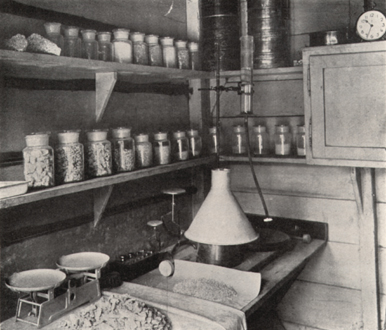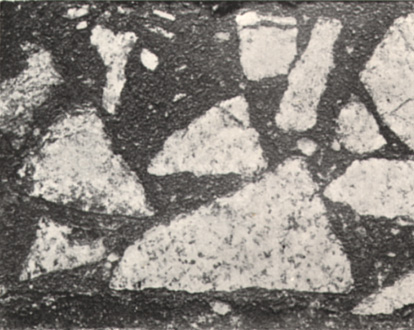 |  |
Plate 15. Corner of typical asphalt plant laboratory. | Plate 11. Close-up view of gritty mosaic surface of asphaltic concrete (full size). |
|
P J M L A R R A Ñ A G A Pedro Juan Manuel Larrañaga (1893 – ?) was a writer and thinker of energy, poetry, and bold rhetorical flourish on asphalt, political economy, agricultural policy, public health. He corresponded with and was a favorite "crank" of John Maynard Keynes, earning him a line or two in Robert Skidelsky's biography of Keynes – "a Basque mining engineer, who struck Keynes as a brilliant amateur..." All I can do here is provide what amounts to a bookmark to Larrañaga's work. I encountered Larrañaga whilst searching through older literature on asphalt, years ago. What struck me about him was his enthusiasm for his subject, which was grounded in but not limited by engineering details. I suppose his obscurity – tempered by the Keynes connection – was another interesting factor, ditto his iconoclastic bent. Larrañaga was a writer first, I think, more at home in the library or studio – or laboratory, as shown above – than elsewhere. Asphalt, and any use of aggregates, involves the infusion of structure into its chaotic granularity. Larrañaga was certainly not the only one to seek to strengthen discipline and the scientific attitude in paving, but he did so with an almost missionary fervor. One finds only a couple of passing references to paving in the later available writing, however. An economic historian might find some prescience in Larrañaga's idea of the Discretionary Gold Mine, vis-á-vis World Bank and other lendings to the "Third World" that would – eventually – need to be written off. I suspect that there is much of value to be found in some marginal writing, such as Larrañaga's, on development and monetary policy. Larrañaga's first publications were two patent specifications, leading to his Successful Asphalt Paving (1926) in which they appear as appendices. | |
¶ |
UK Patent Specification 192,878
To download the four-page PDF, go to espacenet, click "original document," then "Save Full Document." |
¶ |
UK Patent Specification 199,311
To download the four-page PDF, go to espacenet, click "original document," then "Save Full Document." |
¶ |
Successful Asphalt Paving: A Description of Up-to-date Methods, Recipes & Theories, with Examples and Practical Hints, for Road Authorities, Contractors, and Advanced Students (published for the author by Richard Clay & Sons, London, 1926). This book argues the effectiveness of asphalt in improving our world, even leading to world peace. It is primarily technical, yet begins and ends with visionary flourishes. Larrañaga's assertions might strike us as excessive, but are no more so than contemporary paeans to the Internet and globalization, and what both will do for world peace and prosperity. The book is far better written and produced than one might expect. Its stirring conclusion can be found here. |
¶ |
Gold, Glut and Government: A New Economic Dawn (London, G. Allen & Unwin, 1932)
|
¶ |
Larrañaga participated as a delegate from Peru in conferences of the Inter-American Financial and Economic Advisory Committee, in Panama in the Winter of 1939-40. ("IAFEAC was created at the first meeting of the Ministers of Foreign Affairs of the American Republics, Panama, September 1939 (SEE 43.2.37), to promote closer commercial, financial, and economic relations among the republics of the Western Hemisphere. Subcommittee on Post-War Problems was created, 1942, to help plan the transition from a wartime to a peacetime economy in the hemisphere." NARA summary) |
¶ |
Senderos en la junga económico-politica collección de conferencias: ensayos y articulos [paths in the political-economic jungle] (Lima: Editorial Bolivar, 1940) |
¶ |
"'Esperanto', money and babel for a new banker's ramp: new world currency proposals, their background and potentialities" (July 1943), paper in the J. M. Keynes archives, Kings College, Cambridge (search for "Larranaga". Larrañaga argues for a credit facility for developing economies, specifically in Latin America; the credit would be created ex nihil, from a "Discretionary Gold Mine". "Discretionary" seems to have meant "virtual." Included as a appendixes to this draft are two memos (dated respectively November 20 and 27, 1939) presented to the Inter-American Financial and Economic Advisory Committee, on "The Creation of a Pan American Bank" and the "Choice of Monetary Unit-Of Account for the All-American Bank." Larrañaga initiated a sporadic epistolary relationship with Keynes in 1931, with a self-described "intrusion" in order to present his ideas. He mentions his involvement in road building and paving, and the letterhead identifies him as "consulting highway engineer." That missive was drafted in Sevilla, Spain; other installments were sent from London (1931, 1932); Cadiz and Barcellona, Spain, where he refers to a local road he had built eight years prior (1932, 1933); Los Angeles, where he writes of establishing a manufacturing business (1935); and Lima, Peru (1943). Keynes thought his ideas extreme, but their epistolarly relationship, while sporadic, did span more than a decade and is strangely moving. Larrañaga was no cold fish, as many of Keynes's correspondents were. Also among the Keynes material is 'Gold and the world depression', December 1930 - typescript and correspondence, January 1931. |
¶ |
Predicas En El Desierto: Estudios Basicos Sobre Nuestra Realidad Economica (Lima, Sanmarti y Cia. S. A. : 1947) A list of the 56 articles contained in Predicas appears below; in a preface, Larrañaga groups them (57, in fact) under four headings -- 1. Pensamientos generales relativos al cuadro ético y geográphico, del que se derivan las nociones de fondo económico social y geo-político. 2. Alegatos relativos a la alimentación y a la agricultura con sus reacciones sobre la economía general y la moneda. 3. Nociones modernas sobre moneda, finanzas, inflación y cambios, aplicadas a la economía del Perú. 4. Instituciones económicas diversas y comentarios a la política internacional contemporánea. |
1 |
Sur Allende el Trópico : La Nueva Tierra Prometida (5) |
2 |
Libertad de Prensa (16) |
3 |
La Economía y la Etica (20) |
4 |
Pio XII y la Post-guerra : Comentando un Articulo de Belaunde (23) |
5 |
Etiquetas Anacrónicas y Realidades Políticas (30) |
6 |
Primeros Ensayos de Metafísica (34) |
7 |
Raíces Geo-Económicas del Nacionalismo Peruano (36) |
8 |
Nociones Post-Diluvianas de Economía (39) |
9 |
Politica Económica del Aprismo : La Tercera Conferencia de Haya de la Torre (42) |
10 |
Nueva Visión de Destino Económico del Perú (44) |
11 |
El Perú en Breve Síntesis (52) |
12 |
Visiones del Nuevo Perú : La Corporacion del Santa (59) |
13 |
La Colonización de Nuestra Montaña (65) |
14 |
Política de Inmigración (68) |
15 |
¿Emigración o Inmigración? : En el Peru sobra GENTE pero hay gran demanda de ESCLAVOS (72) |
16 |
Desarrolla o Desmantelar (74) |
17 |
La Función Social de la Tierra (76) |
18 |
El Problema de la Alimentación (80) |
19 |
La Alimentacion Nacional y la Agricultura de Exportación (84) |
20 |
La Orientación de la Agricultura Costeña (87) |
21 |
La Conferencia de la Alimentación (91) |
22 |
La Agricultura de la Costa y la Situación Alimenticia (94) |
23 |
El Déficit Fiscal y los Impuestos (98) |
24 |
La Agricultura y el Cambio (103) |
25 |
Verdades Incómodas sobre el Algodón : Urgencia de una reorientación agricola (107) |
26 |
La Catástrofe Mundia y Nuestra Situación Económica (110) |
27 |
Aritmética Alimenticia : Problemas nacionales insospechados por los nacionalistas (115) |
28 |
La Economia Peruana en la Post-Guerra (120) |
29 |
De Toros y de Política (123) |
30 |
¿Cual debe ser la Política Económica Inmediata del Gobieerno? : Socialismo o canibalismo (125) |
31 |
Critica y Solución de la Política Alimenticia : Respuesta al memorial de la Sociedad Nacional Agraria (131)
Consumo de Alimentos "Protectores" en los Principales Paises del Mundo (table)
|
32 |
La Constitución y la Moneda (140) |
33 |
Algunas Consideraciones sobre la Inflación (147) |
34 |
La Verdad Sobre la Inflación (150) |
35 |
La Inversión del Ahorro y la Estabilidad Monetaria (156) |
36 |
La Teoría Cuantitativa del Dinero (163) |
37 |
Los Precios y la Política Monetaria (166) |
38 |
El Antimetalismo y el Oro (169) |
39 |
El Debate Financiero (173) |
40 |
Vade Mecum de Critico Hacendista : Principios básicos de economía pública (177) |
41 |
Nociones Post-Diluvianas Sobre Hacienda (181) |
42 |
El Mundo de Post-Guerra : Los proyectos de banca y moneda mundial, Sus antecedentes y potencialidad (185) |
43 |
El Fondo Establizador de la Moneda (205) |
44 |
La Conferencia de Bretton Woods (209) |
45 |
La Exposición Hacendaria en el Senado (216) |
46 |
Lo que dijo el Ministro de Hacienda (220) |
47 |
Calidad Imprescindible de Próximo Gobierno (224) |
48 |
¿Cuál debe ser la Política Económica Inmediata del Gobierno? (228) |
49 |
El Petróleo, Combustible Estatégico Maximo (232) |
50 |
El Turísmo (236) |
51 |
La Corporación del Santa (Un reportaje) (240) |
52 |
¿Quí ha realizado hasta la fecha la Corporación del Santa? (253) |
53 |
Nuevos Rumbos en el Nuevo Mundo (257) |
54 |
Inglaterra Recupera el Cetro (266) |
55 |
Reminiscencias de Lord Keynes (268) |
56 |
La Política Fiscal y la Economía Nacional (274)
|
¶ |
Robert Skidelsky, John Maynard Keynes, Volume Two, The Economist as Saviour 1920-1937 (1992).
|